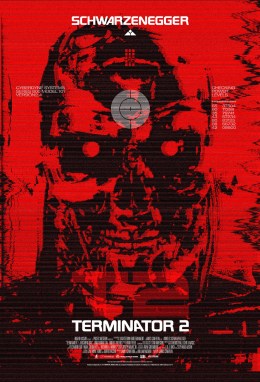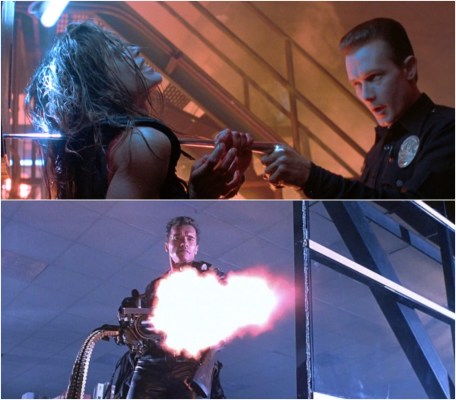
Directed by: James Cameron || Produced by: James Cameron
Screenplay by: James Cameron, William Wisher || Starring: Arnold Schwarzenegger, Linda Hamilton, Robert Patrick, Edward Furlong, Joe Morton, Earl Boen, Janette Goldstein, Enrique Salceda
Music by: Brad Fiedel || Cinematography: Adam Greenberg || Edited by: Conrad Buff, Mark Goldblatt, Richard A. Harris || Country: United States || Language: English
Running Time: 137 minutes
James Cameron’s Terminator 2 (T2) is one of a select list of high-concept films from the past 3-4 decades that, for better or for worse, changed mainstream movie-making and helped transform Hollywood into the blockbuster machine and pop culture generator it is today. In chronological order, they are:
- Star Wars (1977): Building on the wide release and summer schedules pioneered by The Godfather (1972) and Jaws (1975) before it, Star Wars crushed the New Hollywood era of auteur filmmaking and established the now commonplace blockbuster formula of genre-fusion, monomythic storytelling, and high-concept special effects.
- Terminator 2 (1991): Cameron’s long-awaited sequel to his 1984 classic represented a breakthrough in visual effects and computer generated imagery (CGI). It introduced the first ever partially CGI-created character, Robert Patrick’s T-1000, and the first use of motion-capture. Its massive success further drove Hollywood to overvalue sequels, computer effects, and stars.
- Jurassic Park (JP, 1993): Steven Spielberg’s dinosaur-classic brought forth a brief period of CGI restraint, where dinos not only exploded in popularity and the film was lauded for its first depiction of living animals rendered through computer effects, but CGI remained new enough that, from then on, it was used sparingly and only when necessary. Needless to say, this tactful restraint wouldn’t last long.
- Independence Day (1996): Roland Emmerich’s quintessential “big, dumb” American disaster movie about a global alien invasion expanded on the CGI, practical FX, and physical scale of previous Hollywood blockbuster trendsetters to heighten general audiences’ tolerance for high production spectacle over creative screenwriting.
- The Matrix (1999): Arguably the most original blockbuster since Star Wars, The Wachowskis introduced the now classic “bullet-time” effect and popularized martial arts action sequences in the West, all amidst an ingenious genre-blend of cyberpunk, Western motifs, Hong Kong action, and dystopian science-fiction.
- The Lord of the Rings (2001-2003): Peter Jackson’s trilogy helped reinvigorate Tolkein lore in popular fiction and established classical fantasy as a marketable big-budget genre. It also demonstrated the public’s irritating patience for longer films, larger franchises, more prevalent CGI, and filmic adaptations of literary works stretched across multiple yearly installments.

Schwarzenegger (right) protects the young Furlong (left) from a predatory liquid-metal Robert Patrick (off-screen).
Part of the reason the Terminator franchise’s fall is so depressing is that it had so far to fall, further than the likes of, say, JP. Cameron’s original Terminator, his first credited feature film (as both writer and director), was a wonderfully simple, gritty, and heartfelt movie whose story feels simultaneously restrained and ambitious even to this day. The backstory for its tale, a post-apocalyptic future where a villainous, self-aware, artificial intelligence has launched a nuclear winter and sent an army of robot exterminators to root out surviving humans, hadn’t yet become its own mythos. It was a creative yet subdued framework on which to hang its story: A Terminator (Arnold Schwarzenegger) is sent back in time to kill the future mother of the human resistance (Linda Hamilton), and a lone human soldier (Michael Beihn) is sent back in time to protect her.
Fast forward seven years, then a not uncommon length of time between sequels, and Hollywood had become a much different place. The 1980s decade of commando-action extravaganza was coming to a close, Arnold Schwarzenegger had become a Hollywood icon, and James Cameron had established himself as a bankable blockbuster filmmaker, a thinking-man’s action director. Given the film’s incredible ambition and breakthrough special FX, the scope and budget of T2 was many times that of its predecessor. Its $102 million price tag allowed for not only brief sequences of Robert Patrick’s “liquid metal” transformation as the T-1000 (one of cinema’s finest villains), but multiple gigantic set-pieces stretched across an extended 137 minute running time. Again, this formula of CGI-powered spectacle + giant running time + huge budget wasn’t quite cemented in the Hollywood mindset until LOTR, but it was getting there.
None of these now overdone, irritating modern trends were a problem in Judgement Day, however, because the core of its story is a well written and well conveyed relationship between a trio of characters for whom we genuinely care. Built around this emotional narrative center is a powerful action cocktail of fistfights, intense shootouts, and elaborately staged car-chase sequences. The reasons for T2‘s iconic status within not just the science-fiction or action genres, but within cinema in general, are these impressive attributes: James Cameron’s fine storytelling, characterizations, and action-direction.
While the film stretches on a bit longer than its choreography and character development warrant, the sheer tastefulness of the violence, special FX, and especially the character-drama make T2 one of Hollywood’s better epics ever made. Much legacy surrounds the burgeoning CGI for the T-1000 antagonist, but many of Patrick’s special FX were practical costumes, models, makeup, and props that best the primitive CGI. Most of the action scenes themselves are orchestrated around vehicular chases, grounded shootouts set in parking lots, office buildings, or construction sites, and good ole fashioned fisticuffs. There remains a huge contrast in not only visceral action quality, but also grounded realism, between the violence in T2 versus that in even a quality modern blockbuster like The Avengers (2012). The action, bullets, and violence in Judgement Day feel real.
What also feels real and tangible are Cameron’s new and returning characters. To this day, I do not understand the appeal of so-called “badass” action heroines like Michelle Rodriguez in The Fast and Furious (2001-2015), Emily Blunt in Edge of Tomorrow (2014), or Katniss Whatsherface in The Hunger Games (2012-2015) when we have James Cameron staples like Ellen Ripley in Aliens (1986) or Sarah Connor in Terminator and T2. Linda Hamilton’s character develops realistically and believably from her naive yet hardening persona in the original film, and is now a physically sculpted, psychologically battle-tested, and yet emotionally tormented woman. She’s aggressive and creative, but is also handicapped by her fear of the future, extreme parental paranoia over her supposed Messiah-like son, and is vulnerable at numerous points throughout the film to the formidable T-1000. These contrasts make her a more interesting character.

Top: Call for John. Bottom: Arnold unloads with his handheld M134 Minigun.
However, the heart of Schwarzenegger’s character and the heart of the entire movie is his and Hamilton’s relationship with John Connor, played by then non-professional child actor Edward Furlong. Furlong’s later career demise would become the butt of many movie-buff jokes, but the kid portrays one of the finer preteen performances in a major Hollywood picture. His growth and oddly captivating, affectionate chemistry with Schwarzenegger is one of the most unique on-screen pairings in sci-fi or action cinema, perhaps drawing closest parallels to Sigourney Weaver and Carrie Henn in another Cameron film, Aliens.
Terminator II: Judgement Day is a terrific action film because it hits all the marks of a great action blockbuster and an effective human story. It’s neither a stuffy melodrama that forgets that irresistible Hollywood spice nor a mindless action-thriller that might otherwise forgo a beating human heart. Like Aliens, the only other Cameron film that rivals T2, Judgement Day combines the best elements of cinema’s wide emotional range — nail-biting, visceral, raw violence and intimate drama. Its got philosophical contemplation for days, and the technical marvels of its action sequences are endless. The brains and brawn of James Cameron’s second definitive masterpiece deserve to be appreciated by all.
—————————————————————————————————————————————————————————————
SUMMARY & RECOMMENDATION: Terminator II: Judgement Day represents James Cameron at his career height, a masterclass of action cinema supported by critical human elements and patient storytelling. Unlike many modern blockbusters, T2 bleeds and blows up every dollar of its massive budget on-screen to create a genuinely epic cinematic canvas. The action demonstrates innovative and diverse special FX, great staging, and even better pacing, while the characters within those violent sequences are deep, noble archetypes worth rooting for.
— However… the film’s third act goes on and on and on, boasting not one, not two, but three false endings. The primitive CGI is more impressive with regards to its legacy and influence than its on-screen realism.
—> HIGHLY RECOMMENDED
? I know now why you cry, but it is something I can never do.
hey!
Nice review. I give my honest opinion about this one. I like T2, but I think I don’t hype it as much as other people do.
The one negative point about this flick is that every time I watch it and the part where they enter the steel factory arrives, I always have that “oh it’s the last part already?” thought.
I always feel that the only thing they do is running and running from the T1000…and it’s like that’s the only thing they do in this movie…and that always takes me off a little bit.
That said, I do think it’s a good movie. They dare to use violence where needed, there’s even some great humor (even Arnold sometimes is funny as shit), and I agree there is some great voice over about humanity and end of wordl stuff by Sarah Connor.
I remember there is a dream scene of S Connor where she sees herself playing with her child and suddenly everything is torn apart by fire. Wow, simply wow…that scene alone is wordt the entire movie. It shows you exactly what she fears…
I have to admit it does make you think that kind of stuff, and the last part where Arnold dies and leaves John Conner behond is pretty emotional (and well shot). So in a way it’s not just about a cyborg travalling throug time, it’s also about family…and the people you spend your time with t’ill the very end.
Posted by dries31 | March 14, 2016, 4:09 amFor my part, I’m OK with the majority of the movie being a chase simply because the film is about survival. It’s a survival thriller candy-coated with bombastic action sequences. The whole affair is supported by an interesting backstory and great characters, so it’s hard for the movie to offend when it feels this genuine.
I’m with you on the never-ending finale, like I stated in the review, but it’s also worth mentioning how T2 set the franchise up for the next 2-3 terrible sequels. The premise for this first sequel is essentially, “Well, now there’s this NEW, bigger and MORE POWERFUL Terminator!” — and you can already feel Hollywood smelling the money and unnecessary overcompensation. Again, Cameron’s a smart enough screenwriter to check off the basics, and he keeps the story on track, but the next three directors just didn’t seem to care or have the muscle to go beyond making “newer,” “fancier” Terminators in T3, TS, and T Genysis.
Posted by The Celtic Predator | March 23, 2016, 12:01 am